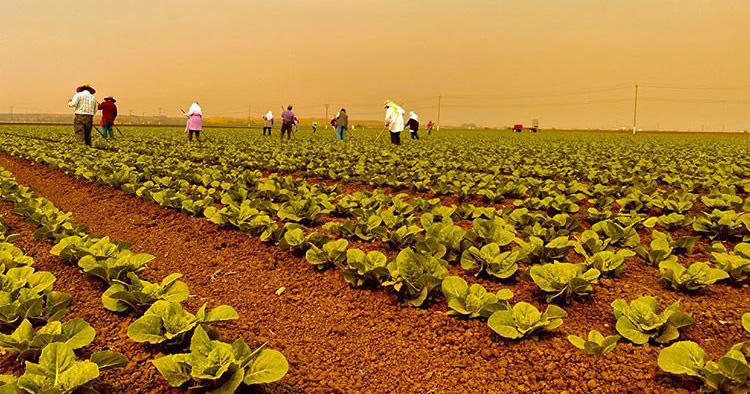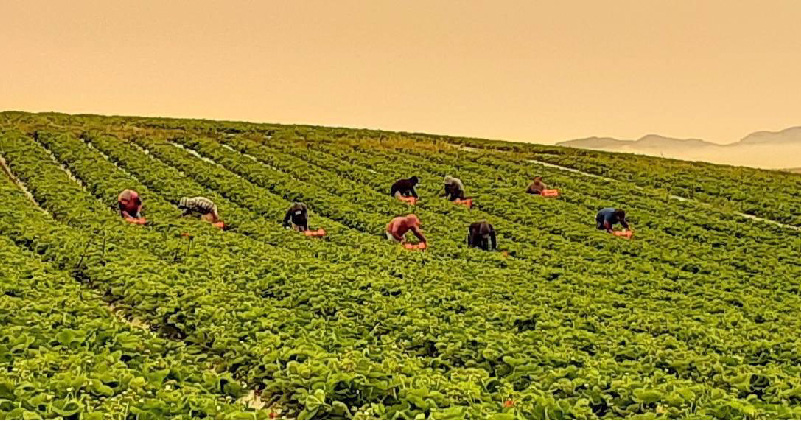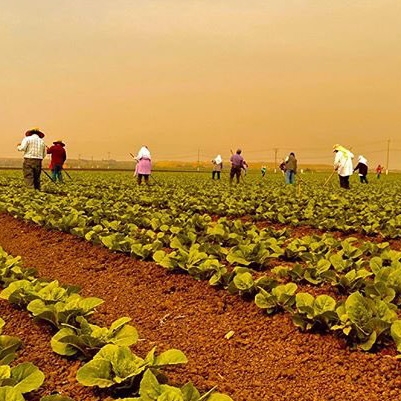Wildfires and COVID-19: When Disasters Overlap, Agricultural Workers Struggle

Photo: United Farm Workers
For almost two months, wildfires have suffocated the Northern California sky. A dry mid-August lightning storm ignited thousands of fires, many of which grew rapidly in the dry late summer undergrowth of forests across the state. By early October, over four million acres had burned in California alone. In some communities, the skies were grey-orange for days on end. In the world-famous wine country north of San Francisco, the LNU Complex Fire burned 363,220 acres to the west of Healdsburg, California, for over six weeks before it was extinguished on October 2nd. But by then, another wine country wildfire, the Glass Fire, had ignited to the southeast in nearby Calistoga, burning down legendary wineries and blackening the air once again.
Agricultural workers already combat extreme heat, pesticide exposure, physical injuries, and other occupational hazards, as they work in one of the most hazardous industries in the country. In 2020, COVID-19 doubled down on the occupational health risks. The virus has ripped through farms and orchards around the country, as agricultural workers continue to work as “essential”, despite an egregious lack of federal and state emergency regulations to protect these essential workers. Even in states with regulations, agricultural workers continue to be vulnerable. In California, where emergency regulations provide critical workplace protections against COVID-19, agricultural workers continue to be at higher risk of COVID-19.
In Healdsburg, on the edge of wine country, farmworker advocates struggled to keep up with the overwhelming and overlapping disasters threatening the health of the “essential” workers who were just beginning the grape harvest. Corazón Healdsburg, a nonprofit working to bridge the racial, cultural, and economic divides in northern Sonoma County, has been hard at work.
As the LNU Complex Fire thickened the air, with air quality index (AQI) reading above 700, “we held N95 mask distributions, because some farmworkers were still working in the vineyards, harvesting wine grapes,” detailed Vanesa Valdizia, Programs Coordinator for Corazón Healdsburg. “We explained to them that it was unsafe to be outside in the smoke, but that, if they were going to be, they needed to wear the right kind of mask. My own eyes were watering after just an hour or two distributing the masks."

Photo: United Farm Workers
Despite a 2019 California regulation that requires employers to provide N-95 respirators to outdoor employees if AQI goes above 150, Valdizia and her team did not see people with farm-provided respirators. “People were coming up to us asking if we had any masks,” she remembered. When asked if they were provided with respirators, farmworkers reported that they were told to bring their own.
Corazón Healdsburg has also responded to the fires by increasing food delivery and other necessities for the thousands of people who had to flee the fire. “For a lot of people, they had been evacuated for two or three weeks, so we’re helping them get food because all the food they had went bad – they had to throw everything away,” when they could return to their homes, recalled Valdizia. Others lost everything: “For those whose homes were damaged or destroyed, we helped them get temporary housing at hotels. We try to support them as much as we can.”
The fires signaled the possibility of an increase in COVID-19, as residents filled evacuation centers and changed routines and habits, which could lead to less adherence of physical distancing. When a mobile rapid testing agency called Curative alerted Corazón Healdsburg that it was heading to the area, Corazón Healdsburg coordinated multiple pop-up rapid testing sites. They worked with the local radio station to provide outreach to the larger community in Triqui and Mixteco, in addition to Spanish. In total, 848 people were tested and received results within 48 hours – the speed being more essential as evacuations expanded. Valdizia said all members of the Sonoma County community showed up for testing. “We never thought we’d get such a good response from the community, but everyone is in need,” she said.
But the pop-up testing was not a long-term testing solution, and as the fires bore down further on the community, Sonoma County’s public health department suspended its regular COVID-19 testing it had been providing. “The smoke is horrible, and to be outside is not healthy at all – they can’t put people in danger by going into the smoke,” Valdizia said, but the need for testing remained very high. Valdizia said at the height of the LNU Complex Fire, she received at least ten calls a day, asking where testing is available. In the meantime, Corazón Healdsburg continued to provide two-week stipends to help community members who tested positive to COVID-19 but are not eligible for government assistance because of their authorization status. The stipend has been a lifeline for those who lack authorization to live and work in the US – many of whom are farmworkers. After an application is completed, the nonprofit provides cash for bills or rent, and delivers food for those who are in isolation. “A lot of [people who test positive for COVID-19] are afraid to ask for help from the government because they’re undocumented,” Valdizia admitted. “Even when we ask, ‘do you need food?’ they say, ‘I don’t want to get into trouble. I don’t know if I can’. We tell them [the stipend program] is not part of the government – we try to make it easy because they are afraid that there will be repercussions.” Over 300 people have applied for the stipend. The fires have slowed down the application process, but Valdizia says they are moving as quickly as possible, knowing the need remains high, and that COVID-19 doesn’t stop just because another emergency starts. “We want to make sure that as many people as possible have what they need to recover safely at home, without pressure to return to work or other obligations too soon," Valdizia said.
Learn more about Corazón Healdsburg: https://www.Corazónhealdsburg.org/ or by connecting with them on social media: @CorazonHealdsburg on Facebook and Instagram and @CorazonHburg on Twitter.
Farmworker Justice offers resources for farmworkers in Spanish, English, and Haitian Creole on federal food, housing, and income assistance in the event of a major disaster.
https://www.farmworkerjustice.org/resource-categories/emergency-preparedness/
Access Migrant Clinicians Network’s recommendations on testing for farmworkers and an algorithm to help farms prepare for testing, in English and Spanish:
https://www.migrantclinician.org/blog/2020/sep/mcn-position-statement-testing-agricultural-workers-helps-essential-workers-stay-safe-
Read EWG’s rundown of state-specific regulations to protect farmworkers:
https://www.ewg.org/news-and-analysis/2020/09/update-seven-months-pandemic-most-states-still-don-t-require-farmworker
Like what you see? Amplify our collective voice with a contribution.
Got some good news to share? Contact us on our social media pages above.
Return to the main blog page or sign up for blog updates here.
- Log in to post comments
